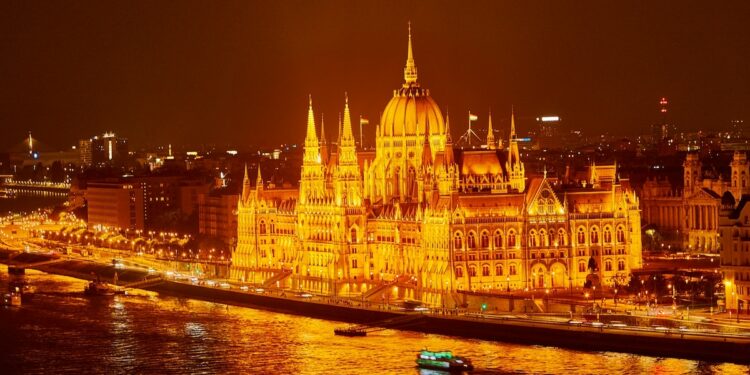Budapest has an obscure, 2000-year-old link to Halloween, which it celebrates annually amid archaeological remains connected to magicians, death hexes, and naked cult rituals. Each October 31, this event at Budapest’s Aquincum Museum honors the city’s little-known origin as a Celtic settlement.
Celtic people are commonly associated with Ireland, where more than two millennia ago they birthed the Samhain festival, which Irish immigrants brought to the United States in the 1800s and it morphed into Halloween. Visitors to Aquincum Museum learn the Celts also created Ak-Ink, the first settlement of what is now called Budapest. Before, in the first century B.C., Ak-ink was gradually replaced by the new Roman city of Aquincum.
Tourists can delve into this history at Aquincum Museum, a spacious, modern facility adjoining 10 acres of excavated remains of the Roman city. Celtic and Roman artifacts are on display to highlight the timelines of Budapest’s evolution and the superstitious society of Aquincum, whose residents used magicians to block curses.
A field of unearthed Roman delights
Visitors can also wander its archaeological park. Scattered across this leafy, serene site are remains of Aquincum’s forum, market, public baths, and artists’ quarter. Tourists can enter an intact temple of Mithras, built by a Roman cult infamous for nude initiation rituals.
Alongside the temple, on Halloween, costumed performers will chant, dance, and wield flaming sticks while re-enacting Samhain. Attendees can also witness Celtic customs like fire duels, warrior ceremonies, fortune telling, and group dances. In addition to guided tours of the museum, visitors can sit in on discussions about Celtic death rituals, readings of ancient stone inscriptions, and re-telling of creepy Celtic legends. This is the only public Samhain event in Budapest, whose Celtic heritage is otherwise all but invisible.
At the Aquincum Museum, Budapest honors its origin as a Celtic settlement when residents used magicians to block curses. Visitors to the spacious facility can also explore the excavated remains of a Roman city.
Photograph by Robert Jakatics, Shutterstock
Budapest’s unlikely Celtic connection
Nowadays, this culture remains robust only in Ireland, Scotland, and Wales, where Celtic languages are still spoken. Yet more than 2,000 years ago, Celts controlled territories across Europe––from Spain, Portugal, Belgium, and Britain in the west, to Hungary, Slovakia, Romania, Slovenia and Croatia to the east. Although they never formed an empire, Celts were bound by common language and culture.
In the late fifth century B.C., Celtic tribes from Switzerland, Germany, and the Czech Republic first became influential in what’s now called Hungary, says András Tóth, archaeologist at Aquincum Museum. Slightly more than a century later, they commanded the land on which the current Hungarian capital was later built.
Hunting a hidden town
Mystery shrouds this first Celtic settlement in Budapest, which is yet to be unearthed, Tóth says. To date, the most important Celtic site discovered here is a large cemetery on Csepel Island, up to 2,300 years old. From 2004 to 2006, excavations here revealed bodies dressed in ornate garments and buried with fine jewellery, weapons, and ceramics.
By the first century B.C., Celtic villages dotted both sides of the Danube River, which splits Budapest, he explains. These communities developed a monetary system, and were skilled in pottery, metalwork, and agriculture. Their hub was a fort on Gellert Hill, a lofty spot tourists visit today for sprawling views of the city, inspect a 19th century citadel, and enter the unique cave setting of St. Gellert Rock Church.
Overlooked museum explains Budapest’s origins
Celtic society peaked here in the early first century B.C. Tourists can visit Aquincum museum to see coins from this era, as well as even older Celtic ceramics. Then arrived the Roman Empire, says Orsolya Láng, an archaeologist and former director of Aquincum Museum. Mighty and intimidating, the Romans are believed to have deposed the Celts with little to no bloodshed.
Aquincum began as a military outpost in the mid-first century B.C., and then boomed into a regional Roman capital, before it was abandoned by the fourth century A.D. “The life of the indigenous Celtic population did not cease: their language, customs, elements of their culture and the Celtic names of their settlements were retained for many decades,” says Láng of the early Aquincum era.
Halloween helps preserve Budapest’s Celtic heritage
Now, however, Hungary’s Celtic heritage has disappeared, says Krisztián Varga, who has studied Celtic history for 20 years and is involved with the museum’s Samhain festival. It is largely the same, he says, in every nation where Celts flourished, except Ireland, Scotland, and Wales.
“The survival of Celtic culture in the British Isles was greatly aided by a strong sense of identity, with the modern population considering themselves direct descendants (of Celts),” he says. “The eastern Celts, however, had a different story. Their culture gradually dissolved as they intermingled with the local population.”
Two millennia later, Budapest’s strongest link to its Celtic era is the upcoming Samhain event. Now in its fifth year, this unique spectacle aims not only to attract visitors to Aquincum Museum, which sits anonymously in the city’s quiet northern suburbs. But also, to highlight the underappreciated impact of the Celts, whose pioneering efforts lay hidden beneath Budapest.
Ronan O’Connell is an Australian journalist and photographer who shuttles between Ireland, Thailand, and Western Australia.
Source link : http://www.bing.com/news/apiclick.aspx?ref=FexRss&aid=&tid=672129e9809046d1b7683a376d25d429&url=https%3A%2F%2Fwww.nationalgeographic.com%2Ftravel%2Farticle%2Fbudapest-hungary-halloween&c=13927904135290419473&mkt=en-us
Author :
Publish date : 2024-10-29 11:30:00
Copyright for syndicated content belongs to the linked Source.


